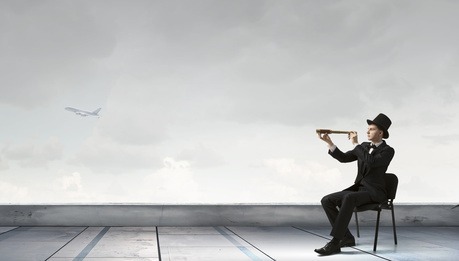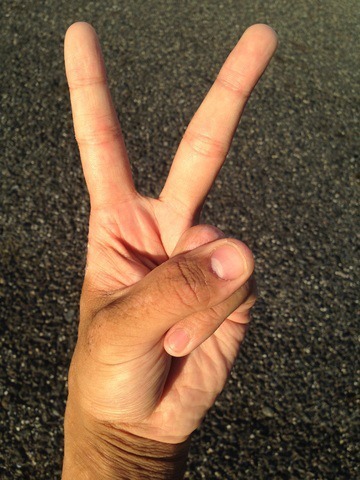The potential impact of an out-of-body experience on our sense of reality
Have you ever been somewhere, fully aware, fully you, yet with a strong impression of having left your physical body behind? Only to return to it afterwards, with a full memory of what just happened? If not, do you consider this to be an actual possibility?
Imagine lying down on your bed and as you sink into the mattress, you simultaneously lift up above your body. Although you know that your body is still lying down, you are not. You are fully conscious, aware of yourself, your thoughts, your sensations and your surroundings. You can float around the room; gravity is not an issue. You can pass through walls, density as you know it doesn’t apply. You can change form. Having two arms, two legs, and a head is optional.
The experience described above is commonly called an out-of-body experience or OOBE for short, “a sensation of being outside one's own body, typically of floating and being able to observe oneself from a distance” . Based on personal experience, this article addresses the rational implications of an out-of-body experience, the relatively mysterious place it holds in today’s society and the reality it reveals.
 A challenge for the rational mind
A challenge for the rational mind
Today, it would appear that we are far from having reached a unanimous view on the subject of out-of-body experiences. Even with the plethora of information and books written on the subject, this phenomenon tends to remain obscure and mostly considered hallucinatory, occult or imaginary. It’s certainly not a conversation starter. Beyond the mystical aspect, this article discusses the impact of an OOBE on our sense of reality and how we relate to it.
On the one hand, to consider the possibility of being out of one's body and all that it implies, is to allow ourselves to become potentially vulnerable by redefining our sense of reality. Being in more than one place at the same time is a challenge for the rational mind.
On the other hand, relating an OOBE is not the same as sharing holiday photos. You cannot just show pictures in the hope that people will grasp what you were feeling as you took them. And yet, if we did not confront the validity of such an experience, sharing it would be simple. Indeed, even if the events are of a very personal nature, the general ‘mechanics’ are the same.
An Hallucination, a dream, an experience...?
When dealing with the intangible, fantasy is never far away. Some will inquire as to whether an OOBE is in fact not a hallucination, trick of the mind, dream, or just an over-active imagination. Consequently, many discussions will be limited to classifying, defining, naming the nature of the experience; while discussing the nomination keeps us from a fundamental consideration: if we are not limited to our physical body, what perspectives does this open up on how our world works?
Upon outing, the body can appear to vibrate powerfully, you may hear violent electrical crackling noises or feel that your ears are imploding. And despite all this, the sensation of lightness and well-being is beyond all physical experience. Lately I heard, simultaneously to loud electrical sparks, the sound of bells and chanting. These reassuring sounds allowed me to maintain a necessary level of attention and resist the temptation of interrupting everything.
Outside the body, the sensation is one of absolute freedom. Freedom from gravity, time, distances and especially the weight of emotions. What strikes me is the familiarity of this state. It is as if I was used to it almost to the point of indifference at another level. My body is elsewhere, and yet I feel absolutely complete.
The main differentiators: presence of mind and active involvement
I started to truly pay attention when I experienced a series of spontaneous OOBEs during the day time as opposed to whilst asleep at night. But even then although the experiences were vivid, my rational mind was still challenged. Being faced with the possibility that I had in fact lost touch with reality and that this was all a very convincing “trick of the mind” loomed at times in the background, especially when sharing with others. But an hallucination, trick of the mind or dream that holds the potential to shift one’s perspective on life to its very foundations is worth more consideration than we generally accord to the matter. Whereas hallucinations and dreams remain mostly vague and elusive, two key characteristics here are, for me, presence of mind and active involvement.
Out of the body, thoughts materialize almost instantaneously. One of my first memories is of passing through my bedroom window. As I was going through it, I became the window. It's not easy to explain, but I had an intimate knowledge of the wood, glass and other materials. I was the wood as I furrowed through it in minute detail whilst simultaneously traversing it.
Even if presence of mind is enhanced out of the physical body, I notice the extent to which I am not the master of my thoughts. Staying focused is an art. I am not all that surprised though, given how easily distracted I am in my day to day life.
Having passed through my window, I am now outside in my parking lot. I circle around someone, trying to get their attention, in vain. I have never seen this person before and I am under the impression that they are somehow not part of the world my physical body is still resting in.
After a few moments, I begin to question my environment. I am floating above the ground, without any particular form. I am a cloud of consciousness. All that is contained within my field of perception, is a part of me. I can become any object by simply focusing on it. As I acknowledge my formlessness, I adopt a “humanoid form”, with arms, legs and a head, and I now find myself floating on my back, still a few meters from the ground.
Being both the scenery and the form contained within it is an interesting sensation. It is familiar and natural. I instinctively zoom in and out of objects, including the humanoid.
Moments later I am back in my physical body, on my bed.
Returning to the physical body can be done at all times. So far, all I have had to do is focus in on my physical body, always there in the background of my awareness, like an omnipresent bubble. And yet somehow this in no way removes the intensity of the experiences. A scenery fades, and another appears, generally in spite of my will to stay. What strikes me most is how much I feel the weight of my emotions upon returning.
A computer screen analogy
While voluntarily and consciously leaving the physical body in and of itself isn’t something people necessarily need concern themselves with - life goes on all the same - the understandings that can be captured through the experience seem fundamental in how we relate to our world.
To use an analogy, it is as if we are normally experiencing life through a computer screen. We are fully focused on whatever is going on within its confines. We are so immersed, we don’t realise that we are in fact the observer, peering in. We are therefore fully involved in the experience and fully identified with the persona within the screen. Anything that occurs there is our perceived sense of reality. It is what we conclude is our existence.
An OOBE is similar to momentarily lifting our eyes from the screen to realise that there is a whole other world around us, including this seeming self beyond the familiar display. When I’m outside my body, I feel omnipresent. I am everything I perceive, whilst also being the framework, the support within which all this occurs. Everything is me. This does not stop us from returning to the screen. Nor does is take away any validity of what we experience here. And we are, almost as if irresistibly, drawn back in. But it brings to the whole experience a new subtext, a new way to relate to life.
Consciously relaxing our attachment
These experiences have by no means rendered me insensitive to the world in which I live. On the contrary, although I consider life differently, I now allow more space for a part of reality that cannot be explained through a purely physical and rational lens.
An out-of-body experience is not something to achieve as a goal in and of itself. It is one of many ways to relate to a greater reality. We can, at any time, through different practices, realise we are not limited to the main character contained within the confines of the monitor. How? Namely by making the conscious choice to relax our attachment to the world around us. And by this acknowledgment, we can not only access an infinitely vaster world, but by the same token enhance our presence within this one and no longer limit ourselves to our persona.
Pour la version française en format pdf, veuillez cliquer ici
Photo credit: Sergey Nivens via fotolia.com


 A challenge for the rational mind
A challenge for the rational mind
